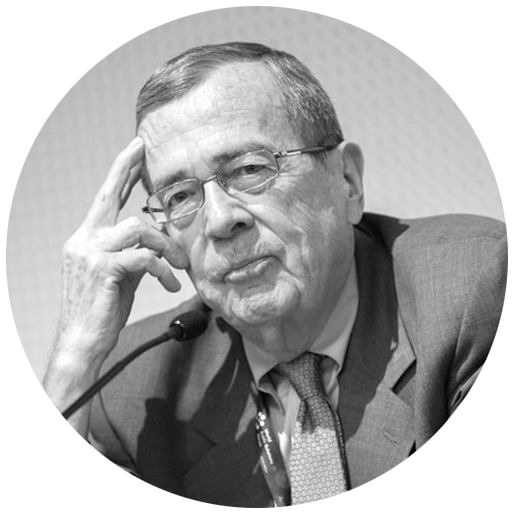Experience
to Purpose
hances are that in the time you read this piece, somewhere on this good earth a journalist will be threatened, censored, assaulted, unjustly arrested, jailed, kidnapped, or, God forbid, murdered. The free press and liberal democracy will have received yet another grievous wound.
As an octogenarian, I view the mission of protecting journalists and journalism itself against such attacks as the “gold” of public service in my golden years.
For me, this has been both a personal and professional life lesson: The talents, experience and relationships gained during a career can have value as contributions to a worthy cause later in life. For years, my affinity community has been journalism. The thread: editor-in-chief at the Manhattan College newspaper; a first job as a reporter/editor; a transition to the public relations profession, where I developed relationships with the media; and now a return to journalism. Finding the worthy, related cause wasn’t difficult.
Actions and abuses against a free press observed across the globe are gravely concerning, and the numbers are even more sobering: In 2019 alone, 25 journalists were killed and at least 250 imprisoned. During the 10-year index period ending August 31, 2019, 318 journalists were murdered for their work worldwide, and in 86% of those cases no perpetrators have been successfully prosecuted, according to the Committee to Protect Journalists Impunity Index 2008-2019, Getting Away With Murder.
The horrific assassination of author and Washington Post columnist Jamal Khashoggi, while perhaps the most familiar, represents just one heinous circumstance that is becoming all too common globally. Such actions, regardless of political affiliations, should alarm every citizen, especially those in the United States. After all, the Fourth Estate is the bedrock of the U.S. Constitution, chartered as the conduit for the people to hold government accountable. This is only achievable with a free and unencumbered press.
Historic events loom on the cusp of the “Turbulent Twenty-Twenties.” Among them: the U.S. presidential election, BREXIT, and the many endemic, enduring protest demonstrations around the world. This is surely the time for nothing but truth in journalism and, of course, throughout society.
Reflecting on past experiences with a lens aimed at the future, I offer these authoritative voices for consideration to illustrate the broad impact and negative repercussions of hampering a free press and, perhaps more alarming, vilifying the media:
In “Who Will Tell The Truth About the Press?” the New York Times editorial board warned: “The rise of the epithet ‘fake news’ as a weapon is occurring at an already perilous moment for the supply of information about the world as it truly is… It’s harder and harder for anyone to know what stories to believe. A world in which governments and citizens can’t agree on a shared set of facts is one in which only the most powerful thrive. The health of democracy, in the United States and around the world, depends on better answers to this challenge.”
Shepard Smith, former Fox News Channel anchor, who recently donated $500,000 to the Committee to Protect Journalists, urged others to contribute while addressing the corrosive forces eating away at our liberties: “…journalists are sometimes wary of being perceived as activists for some cause. But press freedom is not the preserve of one political group or one political party. It’s a value embedded in our very foundational documents… Intimidation and vilification of the press is now a global phenomenon. We don’t have to look far for evidence of that.”
Bob Woodward, at the recent Public Relations of America Society International Conference, pronounced: “Every lie that is told incurs a death to the truth.”
And this recently delivered personal assessment from journalist Kimberly Atkins of WBRU/MSNBC is alarming: “I’m not sure people realize the extent to which journalists are smeared, bullied and threatened, individually, every day. In-person taunts, tweets, calls, emails, snail mail… I put on nylon gloves and cover my face before opening mail sent to my office.”
With their “post-truth” propaganda, demagogues argue that facts are irrelevant. Facts, of course, are the pillars a functioning society needs for security and prosperity. So, consider the societal damage inherent in the following terms now in common use in some circles, referring to professional journalists and mainstream media: “the enemy of the people,” “fake news,” “alternative facts and alternative reality,” “don’t believe what you see”– and, most troubling of all – “treason.”
So, what is to be done?
I did that with two of the organizations leading the defense of journalists and the free press: the Committee to Protect Journalists and the Society of Professional Journalists.
Having long been involved in the premier professional society for my career, the Public Relations Society of America (PRSA), I had the opportunity to help develop the program for the society’s October 2019 San Diego International Conference. I arranged one of the conference’s most important panel sessions, “Journalists, Journalism and the Free Press in Peril,” addressed by advocacy leaders of these two organizations.
- 25 journalists killed in 2019
- The deadliest countries are Syria (7) and Mexico (5) as of 12/16/2019
- At least 250 journalists were imprisoned in 2019, the fourth year in which 250 or more journalists were behind bars
- China is the leading jailer (48), with Turkey close behind (47)
- Egypt and Saudi Arabia are tied for third place (26)
- In line with past imprisoned reports, 98% are local journalists
- Globally, the majority of journalists (66%) face “anti-state” charges
- 30 journalists imprisoned on “false news” charges
- 25 journalists killed in 2019
- The deadliest countries are Syria (7) and Mexico (5) as of 12/16/2019
- At least 250 journalists were imprisoned in 2019, the fourth year in which 250 or more journalists were behind bars
- China is the leading jailer (48), with Turkey close behind (47)
- Egypt and Saudi Arabia are tied for third place (26)
- In line with past imprisoned reports, 98% are local journalists
- Globally, the majority of journalists (66%) face “anti-state” charges
- 30 journalists imprisoned on “false news” charges

And those organizations certainly warrant support, as represented by their portfolios and many programs:
The Committee To Protect Journalists “denounces press freedom violations, meets with heads of state and high-ranking officials, and spearheads and advises on diplomatic efforts.” Key campaigns include Free The [Incarcerated] Press, Freelancer Safety, Gender and Safety of Women Journalists, and Safety Crossing Borders.
The Society of Professional Journalists has repeatedly and aggressively attacked disinformation, as illustrated in its spring 2019 conference, “Quo Vadis Democracy in an Age of Disinformation?” Topics included “Using disinformation to paint the press as the enemy”; “Digital threats to global elections”; and “Weaponizing cyberspace in the 2020 campaign.”
Going forward, I’ll also continue to deliver relevant news and analysis on these and other major issues via our multimedia outlet, Business In Society, covering macro social issues and reporting how businesses are responding. This not only supports my personal mission but helps to build understanding and commitment to the principle that business must now integrate social responsibility with traditional objectives.
There is great satisfaction in “applying experience to purpose” – that is, to a cause. The following, for me, is especially memorable and rewarding:
“Mr. Burson Meets With the Soviets” (1987)
At the request of the U.S. Information Agency (USIA), Harold Burson, the public relations profession icon, led a group of a dozen American public relations executives, myself included, in a series of Washington D.C. and Moscow meetings with our putative Soviet counterparts in an exchange of views and experiences. The Soviets were led by Alexander Yakovlev, the chief of Soviet Communist Party ideology and considered to be the intellectual force promoting Mikhail Gorbachev’s reform via glasnost/perestroika.
One outcome:
Letter from President Ronald Reagan (1988)
“This is simply to thank you for all you’ve done for America by fostering private sector initiatives… I’ve always believed government could draw on the counsel of private citizens who had the knowledge and expertise to solve problems and who would willingly share them at no cost to the taxpayers… You have given invaluable advice about public relations… I salute you for proving so well the private sector’s capabilities.”
Did we help to change the world, even a bit? Maybe. But that was then.
Helping to protect journalists and the Free Press – that is now.
